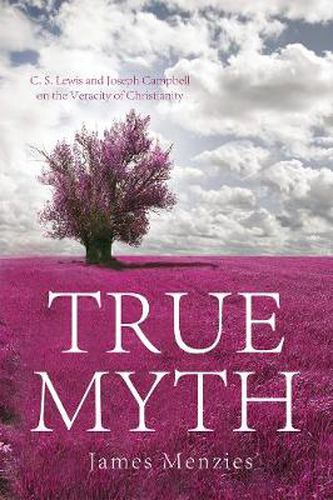Readings Newsletter
Become a Readings Member to make your shopping experience even easier.
Sign in or sign up for free!
You’re not far away from qualifying for FREE standard shipping within Australia
You’ve qualified for FREE standard shipping within Australia
The cart is loading…






This title is printed to order. This book may have been self-published. If so, we cannot guarantee the quality of the content. In the main most books will have gone through the editing process however some may not. We therefore suggest that you be aware of this before ordering this book. If in doubt check either the author or publisher’s details as we are unable to accept any returns unless they are faulty. Please contact us if you have any questions.
Each generation asks in its own way, What does it mean to be human? In True Myth, James Menzies addresses this question by exploring myth and religion in the thinking of mythologist Joseph Campbell and Oxford don C. S. Lewis. Joseph Campbell understood Christianity as comprised of mythical themes similar to those in other religious and secular myths. Admitting that certain portions of the biblical record are historical, he taught the theological and miraculous aspects as symbolic, as stories in which the reader discovers what it means to be human today. C. S. Lewis defined Christianity, and being truly human, as a relationship between the personal Creator and his creation mediated through faith in his son, Jesus Christ. In contrast to Campbell, Lewis took the theological and miraculous literally. Although Lewis understood how one could see symbolism and lessons for life in miraculous events, he believed they were more than symbolic and indeed took place in human history. Not only does Menzies consider the ways Campbell and Lewis utilize myth in answering the question for their generation, but he also probes the influence and presence of myth in philosophy, media, ethics, history, literature, art, music, and religion in a contemporary context, thus helping readers consider answers for their own age.
$9.00 standard shipping within Australia
FREE standard shipping within Australia for orders over $100.00
Express & International shipping calculated at checkout
Stock availability can be subject to change without notice. We recommend calling the shop or contacting our online team to check availability of low stock items. Please see our Shopping Online page for more details.
This title is printed to order. This book may have been self-published. If so, we cannot guarantee the quality of the content. In the main most books will have gone through the editing process however some may not. We therefore suggest that you be aware of this before ordering this book. If in doubt check either the author or publisher’s details as we are unable to accept any returns unless they are faulty. Please contact us if you have any questions.
Each generation asks in its own way, What does it mean to be human? In True Myth, James Menzies addresses this question by exploring myth and religion in the thinking of mythologist Joseph Campbell and Oxford don C. S. Lewis. Joseph Campbell understood Christianity as comprised of mythical themes similar to those in other religious and secular myths. Admitting that certain portions of the biblical record are historical, he taught the theological and miraculous aspects as symbolic, as stories in which the reader discovers what it means to be human today. C. S. Lewis defined Christianity, and being truly human, as a relationship between the personal Creator and his creation mediated through faith in his son, Jesus Christ. In contrast to Campbell, Lewis took the theological and miraculous literally. Although Lewis understood how one could see symbolism and lessons for life in miraculous events, he believed they were more than symbolic and indeed took place in human history. Not only does Menzies consider the ways Campbell and Lewis utilize myth in answering the question for their generation, but he also probes the influence and presence of myth in philosophy, media, ethics, history, literature, art, music, and religion in a contemporary context, thus helping readers consider answers for their own age.